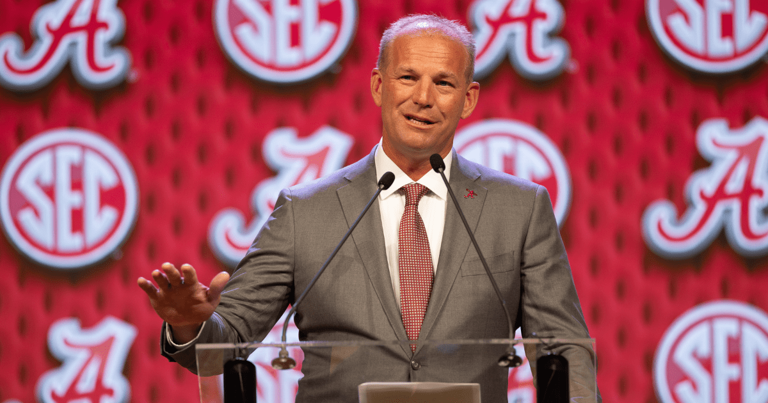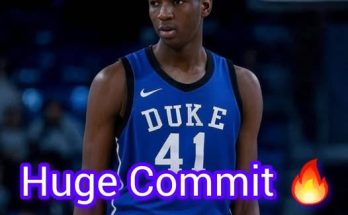Kalen DeBoer didn’t come to Alabama with the illusion that replacing Nick Saban would be easy. But as spring practice wrapped up and the transfer portal window opened, DeBoer remained steady, transparent, and strategic in how he addressed the program’s needs—and just as importantly, how he communicated those needs to the public and to his players. His words and demeanor during spring reflected the same qualities that made him successful at Washington: calculated planning, genuine leadership, and a refusal to panic even as the college football landscape continues to shift around him.
Throughout the spring, DeBoer consistently reinforced one central idea—this was never going to be about chasing stars in the portal just to make headlines. It was going to be about culture. About people. About finding the right fits. DeBoer’s belief in building relationships came across clearly when he detailed the efforts he and his staff made shortly after arriving in Tuscaloosa. Nearly 130 players were spoken to individually. Every scholarship athlete had a meeting. DeBoer’s reasoning was simple: if players were going to trust him, he had to show he was invested in them not just as athletes, but as individuals. Those early conversations served as the foundation for what he believes could become a stable, championship-caliber program—not overnight, but over time.
The transfer portal’s spring window presented DeBoer with both opportunities and potential pitfalls. When asked about his approach, DeBoer didn’t hesitate to acknowledge that Alabama would be active but not reckless. The Tide didn’t need an overhaul. They needed reinforcements. Offensive line depth was a concern. So was the defensive secondary, given a few key departures. But DeBoer’s message was firm—this wasn’t going to be a shopping spree. Alabama would not chase names simply because they were available. Players had to make sense schematically and culturally. They had to want to be part of something bigger than themselves. That, more than raw athleticism, was what DeBoer was hunting for in the portal.
One of the biggest developments of Alabama’s spring came with the return of left tackle Kadyn Proctor, who had transferred to Iowa before electing to come back to Tuscaloosa. DeBoer welcomed him back without hesitation. He made it clear that relationships can be repaired and that there’s room for grace in college football when the player and the program are both aligned in purpose. Proctor’s decision was a meaningful one—it stabilized an offensive line that had been searching for clarity, and it sent a message to other players that DeBoer was someone worth playing for.
DeBoer also emphasized that Alabama would continue to monitor the portal for specialists, which led to the addition of kicker Graham Nicholson from Miami (Ohio). That move was not flashy, but it was purposeful. DeBoer praised Nicholson’s accuracy and maturity, and he reiterated that no position is too small to matter when building a winning roster. Another portal addition, defensive back Kameron Howard from Charlotte, fit a similar mold: an under-the-radar player with potential and a team-first mentality. DeBoer’s satisfaction with these moves was less about how they looked on paper and more about how they functioned within the broader context of team dynamics and long-term depth planning.
Even when asked about high-profile areas like quarterback, DeBoer remained measured. He expressed full confidence in Jalen Milroe, who returns as the presumed starter. But DeBoer didn’t stop there. He also praised Ty Simpson, Dylan Lonergan, and Austin Mack—each of whom competed fiercely during spring. DeBoer stressed that the goal was not to bring in someone to “fix” the position, but to develop what he already had. That sentiment was echoed in his comments throughout the spring: development matters. Portal additions were about gaps, not overhauls.
Perhaps the most revealing part of DeBoer’s transfer portal philosophy came when he discussed the system itself. He didn’t shy away from offering a thoughtful critique, suggesting that the sport might benefit from eliminating the spring portal window altogether. In DeBoer’s mind, a single, consolidated portal period would allow programs to maintain more consistency. It would also give players time to properly assess their place within a program without feeling rushed or pressured during spring transitions. While DeBoer acknowledged that every player should have freedom and flexibility, he also pointed out that constant movement creates instability—for both athletes and coaches.
In a time when the temptation is strong for programs to try and solve every problem with a portal splash, DeBoer’s approach is notable for its restraint. He’s building something sustainable, not transactional. That’s not to say he won’t take a big swing when the right player is available—after all, this is Alabama—but he’s committed to doing it the right way. Every addition has to fit a purpose. Every player has to buy in.
DeBoer’s commitment to team chemistry was another theme that ran through the spring. He mentioned several times that adding a player with the wrong mindset could be more damaging than not adding anyone at all. In a room full of competitors, trust matters. Energy matters. The willingness to be coached matters. DeBoer is not trying to patch holes with short-term fixes that disrupt the locker room. Instead, he’s laying bricks—each one placed with care, each one meant to support the one next to it.
It also became clear during spring that DeBoer is not interested in making promises to recruits or transfers just to land them. Playing time is earned, not gifted. That standard applies whether a player has been in the program for three years or three days. DeBoer’s emphasis on competition has resonated with the roster, especially among the younger players who see a clear path to contributing if they put in the work. It’s a culture that mirrors what he built at Washington, only now with the added pressure—and opportunity—of coaching at one of the most storied programs in college football.
Behind the scenes, DeBoer’s staff has been equally methodical. Personnel evaluations have been constant, and portal scouting has been aggressive but discreet. Alabama is not broadcasting every interest or inquiry. DeBoer prefers to operate quietly and strike when the fit is right. It’s a model that depends heavily on trust—trust between coaches and players, trust within the staff, and trust that the process will bear fruit when it matters most.
There’s also a broader message embedded in everything DeBoer says about the portal: the standard at Alabama hasn’t changed just because the name on the head coach’s door did. The expectations are still sky-high. The commitment to excellence remains. But how that standard is met may look different under DeBoer than it did under Saban. There’s less barking and more listening. Less force, more finesse. DeBoer’s calm, cerebral approach isn’t just his personality—it’s his strategy.
For a program undergoing transition, clarity is crucial. And DeBoer has provided that in how he handles the portal. Players know where they stand. They know what’s expected. And perhaps most importantly, they know that the head coach isn’t panicking. He’s planning. He’s building. And every portal move—or lack thereof—is part of that larger vision.
As the spring portal window closes and summer workouts begin, Alabama fans may not see the kind of splashy transfer headlines they’ve grown accustomed to. But that doesn’t mean the program is standing still. It means the man in charge is making decisions with the long-term in mind. Kalen DeBoer has made it clear that he’s not interested in quick fixes. He’s interested in doing it the right way, brick by brick, player by player. And if the spring portal activity is any indication, Alabama football’s future is in steady hands.



